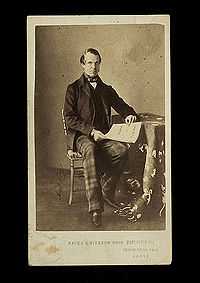Henry Wellesley, 1st Earl Cowley
| The Right Honourable The Earl Cowley KG GCB PC | |
|---|---|
 | |
| British Ambassador to France | |
| In office 1852–1867 | |
| Monarch | Victoria |
| Preceded by | The Marquess of Normanby |
| Succeeded by | The Lord Lyons |
| Personal details | |
| Born | 17 June 1804 Hertford Street, Mayfair, London |
| Died | 15 July 1884 Albemarle Street, London |
| Nationality | British |
| Spouse(s) | Olivia Cecilia FitzGerald (d. 1885) |
| Alma mater | Brasenose College, Oxford |
Henry Richard Charles Wellesley, 1st Earl Cowley KG GCB PC (17 June 1804 – 15 July 1884), known as The Lord Cowley between 1847 and 1857, was a British diplomat. He served as British Ambassador to France between 1852 and 1867.
Background and education
Wellesley was born at Hertford Street, Mayfair, London, the eldest son of Henry Wellesley, 1st Baron Cowley, and Lady Charlotte, daughter of Charles Cadogan, 1st Earl Cadogan. He was a nephew of the 1st Duke of Wellington and the 1st Marquess Wellesley. He was educated at Eton and Brasenose College, Oxford.[1]
Diplomatic career
Wellesley entered the diplomatic service in 1824, receiving his first important appointment in 1848, when he became Minister Plenipotentiary to the Swiss Cantons. In July 1848 he was sent on special mission to the provisional central power of Germany in Frankfurt. This was followed in June 1851 by his appointment as Envoy Extraordinary and Minister Plenipotentiary to the reinstated diet of the German Confederation, a position which he only held for a short time, as he was chosen in 1852 to succeed Lord Normanby as the British Ambassador in Paris. Lord Cowley, as Wellesley had become on his father's death in 1847, held this important post for fifteen years, and the story of his diplomatic life in Paris cannot be separated from the general history of England and France. As Minister during the greater part of the reign of Napoleon III, he conducted the delicate negotiations between the two countries during the time of those eastern complications which preceded and followed the Crimean War, and also during the excitement and unrest produced by the attempt made in 1858 by Felice Orsini to assassinate the Emperor of the French; while his diplomatic skill was no less in evidence during the war between France and Austria and the subsequent course of events in Italy.
In 1857 he was created Viscount Dangan, in the County of Meath, and Earl Cowley. He was further honoured in 1866 when he was made a Knight of the Garter. Having assisted Richard Cobden to conclude the commercial treaty between Great Britain and France in 1860, he retired as ambassador in 1867.
Family
Lord Cowley married on 23 October 1833 the Honourable Olivia Cecilia (d. 1885), daughter of Lord Henry FitzGerald (fourth son of the 1st Duke of Leinster) and the 20th Baroness de Ros, by whom he had three sons and two daughters, and was succeeded in his titles by his eldest son, William Cowley, Viscount Dangan. One of his daughters, Lady Feodorowna Cecilia Wellesley (1838–1920), married Francis Bertie, a British diplomat and a future British ambassador to France. In 1863 Cowley inherited the former Long family estate of Draycot Cerne in Wiltshire from his kinsman the 5th Earl of Mornington, and he lived in retirement until his death on 15 July 1884.
Further reading
- Hand of Fate: The History of the Longs, Wellesleys and the Draycot Estate in Wiltshire. Tim Couzens 2001 ISBN ISBN 1-903341-72-6
References
- ↑ "Henry Richard Charles Wellesley, 1st Earl Cowley". The Peerage. 19 February 2011.
External links
- Hansard 1803–2005: contributions in Parliament by the Earl Cowley
- Photograph in the National Portrait Gallery
| Diplomatic posts | ||
|---|---|---|
| Preceded by Stratford Redcliffe |
Minister Plenipotentiary to the Confederated States of the Swiss Cantons 1848–1851 |
Succeeded by Sir Edmund Lyons, Bt |
| Preceded by Hon. William Fox-Strangways |
Envoy Extraordinary and Minister Plenipotentiary to the German Confederation (Special Ambassador 1848-1851) 1848–1852 |
Succeeded by Sir Alexander Malet, Bt |
| Preceded by The Marquess of Normanby |
British Ambassador to France 1852 – 1867 |
Succeeded by The Lord Lyons |
| Peerage of the United Kingdom | ||
| New creation | Earl Cowley 1857 – 1884 |
Succeeded by William Wellesley |
| Preceded by Henry Wellesley |
Baron Cowley 1847 – 1884 | |